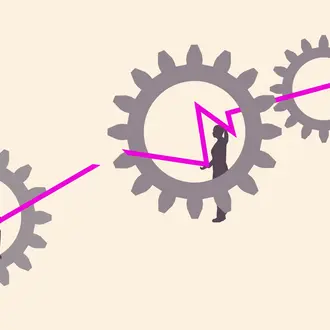Digital Economy
How much are search engines worth to you?
With so many free digital services, GDP isn’t as useful as it once was to measure economic well-being. New research tries out a different approach.
How much do Wikipedia, email, YouTube, and other digital technologies contribute to our economic well-being? According to a new study, quite a lot.
The study by MIT Sloan economist Erik Bryjolfsson, doctoral candidate Avinash Collis, and Felix Eggers, of the University of Groningen in the Netherlands, uses massive online choice experiments to measure the value digital goods and services create.
According to the research published today in the Proceedings of the National Academy of Sciences, internet search is the most valued category of digital goods. The median user would require compensation of $17,530 to forgo search engines for a year. Users would need $8,414 to lose access to email for a year, and $3,648 to go without digital maps for that same period.
“We knew intuitively that the rapid pace of innovation and the widespread adoption of digital goods and services have had an important effect on our economic welfare — but our research demonstrates just how valuable these modes of communication are to many people,” said Brynjolfsson, who is co-director of the MIT Initiative on the Digital Economy. “These services are so tightly integrated into people’s daily lives for coordination with family, friends, and colleagues, and they add a lot to our overall well-being.”
While many economists, policymakers, and journalists use gross domestic product as a proxy for well-being, the figure does not translate well in this new digital age. GDP measures the total value of all final products and services and is derived using market prices. This means that products that have a price of zero — which include most smartphone applications, Wikipedia, Facebook, and so on — have zero direct contribution to GDP.
In principle, changes in consumer surplus — loosely defined as the difference between the amount consumers would be willing to pay for a good or service and the amount that they actually pay — provide a superior, more direct measure of changes in well-being, particularly for digital goods. In practice, however, consumer surplus is difficult to quantify.
Massive online choice experiments can help shed new light, according to the researchers. These experiments measure consumer willingness to accept compensation for losing access to different goods, thereby calculating the consumer surplus the goods produce. In some cases, the transactions were hypothetical; in other cases, the transactions were enforced, meaning that participants received compensation only if they went without the given product or service for a predefined period.
“In the 21st century — at a time when so many of the goods and services that people consume are digital and free — GDP falls short,” Brynjolfsson said. “For policymakers, regulators, and economists looking to understand changes in living standards, and by extension the effects of policies that might affect living standards, it’s clear we need other measures besides GDP. The crucial question is: how much is all this digital stuff worth to us?”
According to the study, social media is also highly valued by consumers. The research team found that U.S. Facebook users would require a median compensation of $40-$50 for leaving the social networking service for one month.
The median value was even higher in Europe. Dutch Facebook users would need a median compensation of €97 ($110.88 in U.S. dollars) for losing one month of access to Facebook.
The research team says there are some limitations to their results. For example, given their sample size of about 80,000 people, the researchers are able to provide only a relatively coarse estimate of changes in consumer surplus. Another limitation is that the study is biased toward people using the internet. The choice experiments were only accessible online, and therefore people not using the internet at all — which represents around 11 percent of the U.S. population — were excluded.
“Despite these constraints, the choice experiments we conducted are at least attempting to directly measure a concept that we know is not correctly measured by other official data,” Collis said. “GDP is useful, but it offers a very incomplete picture; our results provide a more accurate view of people’s economic well-being. And we believe it is better to be approximately correct than precisely wrong.”




